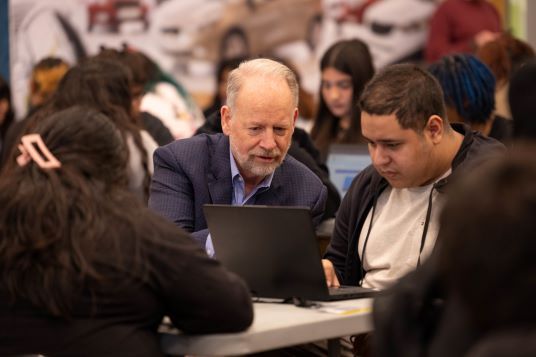1. Tell us about your company and the problem it solves or its benefit to learners or educators.
At UWorld, we believe every student deserves the best possible resources to achieve their educational goals. We were founded on the idea that high-stakes exam preparation should be clear, effective, and rooted in a deep understanding of the content, not just surface-level memorization. Whether it’s the SAT®, MCAT®, USMLE®, CPA, NCLEX®, CFA®, bar exam, or NAPLEX®, we’re helping students and professionals alike succeed in some of the most competitive environments on some of the most high-stakes exams.

The core problem we’re solving is twofold: lack of access to high-quality, realistic test prep materials and the inefficiency of traditional study methods. We design our tools to bridge that gap by combining expert-level content with an active learning experience. Every question we develop is not just a practice item — it’s a teaching tool, backed by in-depth, industry-leading answer explanations that make learning intuitive and lasting. We’ve seen our approach translate into real-world success for millions of learners who are now doctors, nurses, CPAs, lawyers, pharmacists, and more.
2. Tell us about your area of expertise and how your knowledge or work enhances the field or the edtech industry.
My background blends strategy, finance, and operational leadership, with an enduring passion for building organizations that make a meaningful impact. At UWorld, I’ve focused on scaling our mission while maintaining the integrity and rigor that define our products. That means aligning our growth strategy with our pedagogical philosophy — never compromising on quality in the name of speed or volume.
In EdTech, there’s often a tension between innovation and efficacy. My expertise lies in ensuring those two work hand in hand. I guide our teams to adopt technologies that amplify what we do best — delivering superior educational content — rather than chasing trends. That deliberate, mission-aligned approach has helped us stand out in a crowded marketplace and sustain long-term growth.
3. Explain a problem in running an EdTech company or selling products or providing service in the space that is related to the work you do?
One of the most pressing challenges we face is maintaining the integrity and academic quality of our content in a landscape where speed and cost-efficiency are often prioritized over depth and accuracy. This tension has become even more pronounced with the increasing use of artificial intelligence in content generation. Many EdTech companies are leaning into generative AI to produce practice questions and learning modules at scale. While that may seem efficient on the surface, it introduces significant concerns around content reliability, cognitive rigor, and instructional soundness.

A recent report in the Los Angeles Times noted that the State Bar of California used AI to generate bar exam questions for a recent testing window. The article highlighted widespread criticism from legal educators and test-prep professionals who questioned the validity and quality of those AI-generated items. When stakes are this high — whether it’s the bar exam or a medical licensing board — learners can’t afford ambiguous or weak materials. The consequences are simply too significant.
At UWorld, we’ve made a deliberate decision not to use AI to write our test prep questions. Every item we create — illustrations, answer explanations, course content, etc. — is produced and authored by our in-house team of educators, subject-matter experts, and licensed professionals. This ensures academic integrity and aligns with the latest testing standards and learning methods. Our commitment to handcrafted content differentiates us in a market increasingly saturated with shortcuts.
We do embrace AI to help our students study more efficiently — from generating dynamic study plans to helping physicians and medical students look up the most recent and relevant articles to treat patients. AI also makes some administrative tasks more efficient for our educators, allowing them to focus on teaching rather than building lesson plans, quizzes, and more.
So, the challenge isn’t just explaining why our approach is different — it’s helping students, parents, and educators understand why that difference matters. We have to counter the narrative that faster or cheaper is better, and remind the industry that educational quality is still — and always will be — our highest priority.
4. What are 3-5 specific tips to solving that problem?

- Lead with outcomes. We rely on user data, testimonials, and pass rates to show tangible results. It’s not enough to say “we’re better” — we have to prove it. As one example, there’s a reason Themis, a UWorld company, is the only bar review company that routinely publishes its first-time test-taker pass rates.
- Invest in content quality. We never compromise here. Our content is written, reviewed, and refined in a 17-step process by practicing professionals and subject matter experts who work for us. That commitment shines through in learner success.
- Educate the customer. Through webinars, blog content, in-platform messaging, media outreach, volunteer work, and charitable product donations, we help users understand how to use our tools effectively — and why they’re structured the way they are. From exam-like questions, detailed answer explanations, and vivid illustrations to precise videos, comprehensive study guides, and active learning tools, we engage students throughout the entire learning process — whether they are in class or studying independently.
- Build trust through transparency. We avoid gimmicks. Everything we offer is grounded in evidence-based instruction and clear value. We survey our students and publish our results for everyone to interpret. Data back our pass rates. Recently, UWorld students achieved a 98% pass rate on the NCLEX-RN® and NCLEX-PN®. Our strict inclusion criteria guaranteed the statistical validity of our survey results: We only included users who took the exam between certain dates, answered more than 500 of our practice questions, and stayed active up to 6 months before their exam date.
- Listen and iterate. We take user feedback seriously, using it to refine our products, messaging, and support services. We recently added a medical library that can be purchased as a supplement to our medical courses and resources. This tool is ideal for preclinical students, clinical students, and even practicing physicians because it covers high-yield topics from the basic sciences to clinical medicine, detailing their pathophysiology, diagnosis, and treatment.
5. What other advice do you have for professionals working in EdTech?
Stay relentlessly focused on your mission. EdTech is evolving quickly, and it’s tempting to chase every new trend or tool. But your greatest differentiator is your commitment to solving one meaningful problem really well. Also, never lose sight of the human element. Behind every metric is a student, a teacher, a life that’s being changed through learning. If you keep that at the center of your strategy, success will follow — not just in revenue, but in impact.


